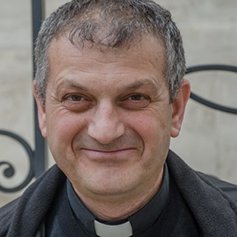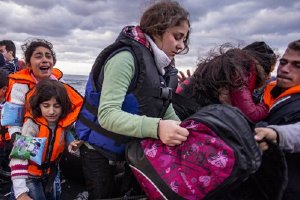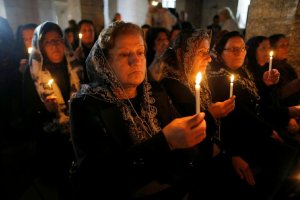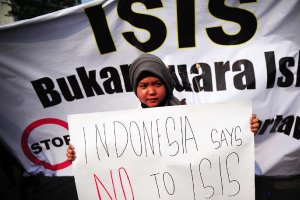A Syrian-Catholic monk kidnapped and held hostage for nearly five months by Islamic State militants believes he is still alive because of the humanitarian work he did among Muslims displaced during the war in Syria in the years before he was abducted.

The monk, Father Jacques Mourad, told Grégoire de Fombelle of World Council of Churches in an interview published February 7 that members of his diocese in the Syrian city of Homs cared for displaced Muslim families, university students, the poor and sick. “We restored many Muslim homes that were destroyed during the war,” Fr. Mourad said. “All of this bore fruit during my captivity because these testimonies prevented the jihadists of the Islamist State from killing me.”
In May 2015, Fr. Mourad was kidnapped from a monastery in the city of Karyatayn (Al-Qaryatayn) where he was a parish priest.
My experience and the miracle that happened to me made me believe that God is much stronger than all the evil in the world.
—Father Jacques Mourad
Two years after his escape, in a speech at Notre Dame Cathedral in Paris for the Catholic charity Aid to the Church in Need, Fr. Mourad described the day he was taken prisoner.
“On May 21, 2015, a group of masked and armed men invaded the monastery of Mar Elian, which I was in charge of, taking me hostage together with … a postulant at the monastery. We were kept prisoner there in the car in the middle of the desert, for four days, then they took us to Raqqa, where we were imprisoned in a bathroom.”
For 84 days they were interrogated about their faith nearly every day. “I was harangued, threatened several times with beheading, and was subjected to a mock execution for refusing to renounce my faith,” he said.
“On August 4, 2015, ISIS took control of Karyatayn,” said Fr. Mourad, “and then the next morning, at dawn, took a group of Christians hostage, some 250 people, brought from a region close to Palmyra. Obviously, we didn’t know anything about what was going on, since we had been cut off from the world. On August 11, a Saudi sheik came into our cell. He spoke to me. ‘You are Baba Jacques? Come with me! They’ve been battering our ears talking about you!’
“We drove through the desert for about four hours. When we arrived in a compound enclosed by a huge iron gate, the Christians of Karyatayn were around me, astonished to see me. It was a moment of unspeakable suffering for me, and for them an extraordinary moment of joy and pain. Of joy because they never expected to see me survive, and of pain because of the conditions in which we had met again.
“Twenty days later, on September 1, they brought us back to Karyatayn, free again, but forbidden to leave the town. To put it another way, it was a return to life, but not yet to liberty. But already a return to life—what a miracle! I could not help but marvel at it!”
|
In a Vatican News article published December 5, 2019, Fr. Mourad described asking one of the terrorists why the Caliphate was allowing them to return to their homes. “The jihadist chief told me it was because we Christians of this community had not taken up arms against the Muslims. It was an answer that struck me very much and made me understand many things. I understood above all that those who decide not to practice violence can, by their choice, change the attitude of those who are used to taking up arms. We were saved thanks to our vocation as Christians, as witnesses of peace.” Like so many of his fellow countrymen who had to leave Syria, Fr. Mourad still feels hopeful for the future of his country. “The conflict has nothing to do with Christians and Muslims. They have been living in peace for hundreds of years.… The relationship between Christians and Muslims has not changed. Nothing can change the relation between Syrians. My experience and the miracle that happened to me made me believe that God is much stronger than all the evil in the world. |
___________________
From its beginnings, the Church of Scientology has recognized that freedom of religion is a fundamental human right. In a world where conflicts are often traceable to intolerance of others’ religious beliefs and practices, the Church has, for more than 50 years, made the preservation of religious liberty an overriding concern.
The Church publishes this blog to help create a better understanding of the freedom of religion and belief and provide news on religious freedom and issues affecting this freedom around the world.
For more information visit the Scientology website or Scientology Network.


